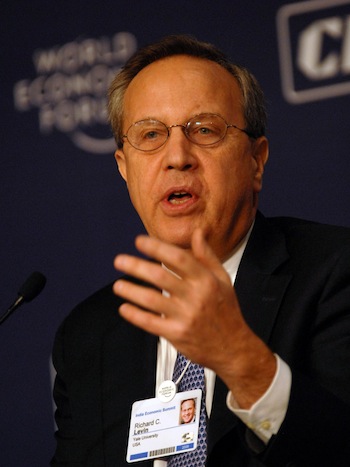Richard Levin Leaves Behind a Mixed Legacy at Yale

Richard Levin speaking at the India Economic Summit in 2008. Credit: World Economic Forum/Flickr.
"I think the faculty want me out," Yale President Richard Levin told an emeritus professor glumly last spring after a faculty vote of "no confidence" in his and his trustees' move to establish a new liberal-arts college, bearing Yale's name, in collaboration with the authoritarian, corporate city-state of Singapore.
Levin's announcement last week that he'll resign effective in June -- and Fareed Zakaria's resignation as a Yale trustee only two weeks earlier -- were indeed driven partly by growing faculty resistance to the "world is flat" corporate expansion of American universities that both men championed. But what now, and what kind of leadership should succeed them?
Not so subtly, the liberal arts at Yale are being reinvented "from the ground up," as one Yale publication put it -- instrumentalized, I fear, not only to benefit Asia's future capitalist leaders but also in a "parallel university" that has been emerging at Yale itself outside of the faculty's deliberation and control.
On Levin's watch, that parallel university bestowed an honorary doctorate upon President George W. Bush an honorary doctorate at the 2001 Yale commencement, where Bush told "the C students among you" graduates that this proves that "you can be president." Levin's parallel university installed Stanley McChrystal as a professor only a few months after Barack Obama fired him. It has hired Charles Hill, Ryan Crocker, John Negroponte, Tony Blair, and, most recently, David Brooks as instructors for undergraduates who thirst for celebrity, authority, and connections from eminences fighting old wars in Yale's classrooms.
The "parallel university" does this through its Grand Strategy, Jackson Institute for Global Affairs, and other programs for Yale undergraduates thirsting for celebrity, career connections, and the "worldly" wisdom of people still fighting old wars.
Yet Levin's and Zakaria's new resignations are no occasion for gloating. "If Rick [Levin] leaves, you'll appreciate how much he was protecting the liberal arts from immense pressures to undermine them and how many other good things depended on him," one of his defenders told me months before.
She may be right. Levin managed Yale well fiscally and physically. He strengthened its bonds to its workforce and to New Haven, and I've credited him with these achievements here before.
He even got the Wall Street Journal's right-wing bashers of the liberal academy -- Robert Whitewater Bartley, John Fund, Bret Stephens -- off Yale's back by touting the Grand Strategy and other national-security oriented programs and Yale's short lived, neo-con propaganda factory the Yale Institute for the Interdisciplinary Study of Anti-Semitism, which the university wisely abolished in 2010.
But while Levin and his trustees have been deft managers of their storm-tossed craft, they've been poor visionaries and navigators for liberal education, whose course will require different risks and courage.
Unless faculty and students can affirm the liberal arts in better ways, Yale may be even more mindlessly corporate after Levin than it has been under him. A similar challenge faces other universities, I argue in an essay, "With Friends Like These, Who Will Defend Liberal Education?", that Dissent magazine will post and publish on October 1 in its special issue on higher education.
Those of us who've criticized Yale's Singapore venture know that many wonderful young Singaporeans want a fuller liberal education, but we also see the advance of a slick model of self-censorship in an authoritarian corporate milieu in that country and, increasingly, in public life in the U.S. While self-censorship in Singapore is ubiquitous and routine owing to fear of the state, here it's embraced almost enthusiastically by some undergraduates who think it will bring them closer to power and commercial advantage.
This old misunderstanding of where power really comes from and how it flows has carried Yale undergraduates from secret, Skull & Bones bonding of yore into countless foreign-policy domestic blunders. Yet some students embrace that kind of self-censorship with refreshed ignorance every year because they want "access" without thinking about what they're gaining "access" to or recognizing that they're only cultivating profiles in timidity.
Students need "access" to what the conservative political philosopher Michael Oakeshott called "the great conversation" of the humanities across the ages about lasting challenges to politics and the spirit. They need to learn how to recognize and take responsibility for meeting those challenges, sometimes even by defying established power instead of saluting or fronting for it.
Levin himself glimpsed this in 2010, when he wrote that "... India has a powerful advantage over China" because "it affords faculty members the freedom to pursue their intellectual interests wherever they may lead and allows students and faculty alike to express, and thus test, their most heretical and unconventional theories -- freedoms that are an indispensable feature of any great university."
Singapore's Han Chinese ruling elite doesn't favor that. Is Yale's ruling elite much better? Faculty and students should insist that Levin's replacement establish new, formal mechanisms that reflect the centrality of the faculty in the life and essence of the university: no more Iron law of oligarchy, in which presidents and other administrators think they're entitled to rule.
And every university president should be asked publicly to restore balance between the institution's academic mission and its economic goals. Every president should try to repair the damage being done to universities' ethos by corporatization.
Conservatives as well as liberals are awakening to dangers in the neo-liberalization of liberal education. What a bitter irony if Yale, which the philosopher George Santayana called the "Mother of Colleges" because it has nourished so many of them and American civil society, has fallen asleep.
